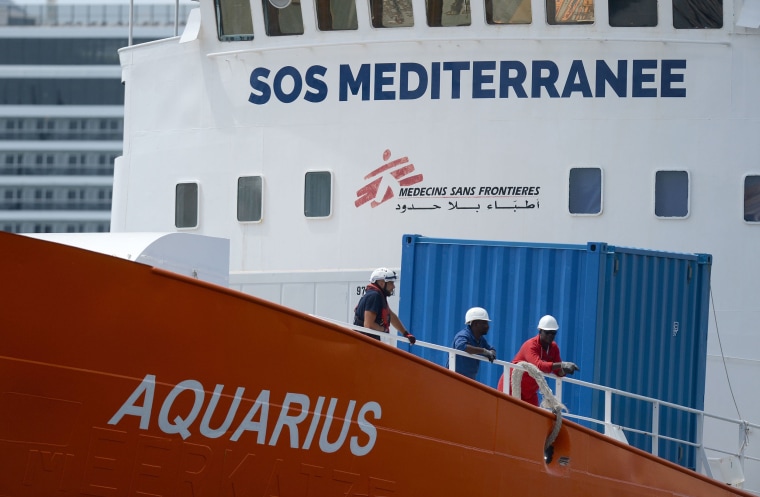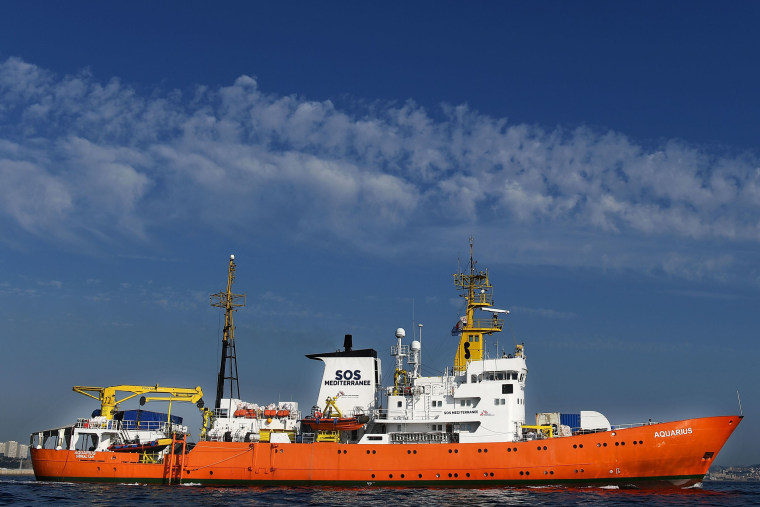An Italian prosecutor has ordered the seizure of a ship that has rescued 30,000 migrants from the Mediterranean Sea, a move seen by aid workers as the latest example of how European countries are taking steps to “criminalize” their operations.
Karline Kleijer, the head of emergencies at Médecins Sans Frontiers (MSF) which jointly operates the Aquarius vessel, described the order as a "sinister" attempt to "stop humanitarian lifesaving search and rescue capacity at any cost."
Italian authorities have also ordered bank accounts belonging to MSF — which is also known as Doctors Without Borders — to be frozen.
Crew members aboard the Aquarius are accused of contravening rules for the disposal of waste.
Following an investigation into how food leftovers, clothes and medical waste were dealt with, a prosecutor in the Sicilian port city of Catania on Monday ordered that the Aquarius be seized.
However, it remained docked in Marseille, France, on Tuesday. Its operators plan to appeal the decision.
The Aquarius became a symbol of how governments are imposing restrictions on aid groups helping migrants trying to reach Europe when it was stranded at sea for 10 days in July after being repeatedly refused permission to dock by Italy and Malta.
SOS Mediterranee, which operates the vessel alongside MSF, “strongly condemned” what it described as a new attempt to “criminalize humanitarian aid at sea.”
“We categorically refute all accusations of participating in illegal activities,” the aid group said in a statement, adding that the Aquarius had always followed rigorous procedures in port.
The Aquarius is not the first rescue vessel to attract the attention of Italian authorities.

In August 2017, the Iuventa was seized under suspicion of providing “assistance” to illegal migrants and allegedly colluding with smugglers.
Several other ships have subsequently been detained by Italian and Maltese authorities on charges ranging from illegally aiding migrants from Libya to not being properly registered.
These cases, combined with Italy and Malta barring such vessels from allowing migrants to disembark on their soil, have effectively halted rescue operations in the central Mediterranean.
Italian Interior Minister Matteo Salvini on Tuesday highlighted his decision to restrict rescue ship operations in the waters off Libya.
“I have done well to block the NGO boats,” the far-right populist politician tweeted. “Not only have I stopped illegal immigrants but also, it would appear, toxic waste," he said, linking to a story on the order for the Aquarius to be seized.
Salvini has previously argued that restrictions on rescue operations exist to prevent Italy from becoming complicit with traffickers who send migrants out to sea knowing that they will have to be rescued.
Meanwhile, the death rate among migrants attempting to cross the central Mediterranean has doubled year-on-year, according to the U.N.'s refugee agency.
A report published by UNHCR in September found that in the first six months of 2018 around one in 18 people trying to complete the sea crossing from Libya to Europe either died or vanished. That compares to a figure of one in 42 people during the same period in 2017, the UNCHR added.
Julia Black, a spokesperson for the International Organization for Migration, said that with fewer dedicated search-and-rescue operations in the waters off Libya, it was "extremely likely" vessels carrying migrants have gone missing without a trace.
Luigi Scazzieri, a research fellow at the Centre for European Reform, pointed out that the Italian judiciary is independent and that the prosecutor's decision should not be seen as an order from the anti-immigration populist government.


